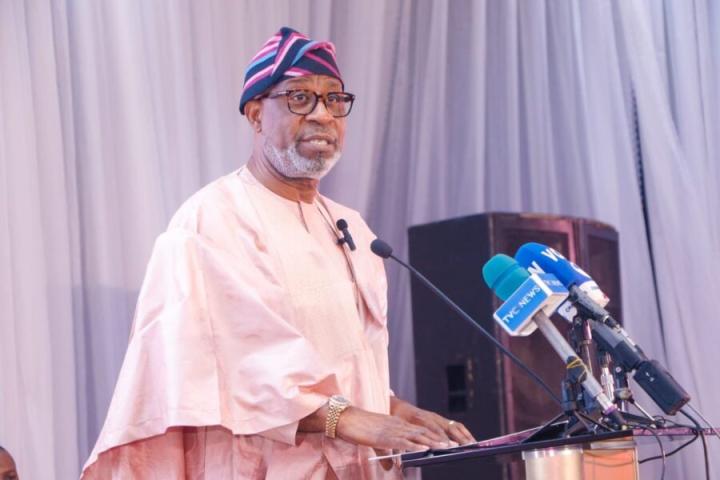Nigeria’s Minister of Solid Minerals Development, Dele Alake, has reiterated that Africa, with its vast mineral wealth and growing infrastructure needs, remains the world’s greatest destination for mining investments. Speaking at a recent international mining conference, Alake noted that the continent possesses abundant deposits of critical minerals needed for the global energy transition, and Nigeria is strategically positioned to benefit from the rising demand.
He explained that Africa’s vast resources—including lithium, cobalt, gold, iron ore, and rare earth elements—are increasingly attracting the attention of global investors, particularly as the world accelerates toward cleaner energy and advanced technology production. According to him, the global shift from fossil fuels to renewable energy presents a historic opportunity for Africa to leverage its mineral resources to drive industrialisation, job creation, and economic diversification.

Alake said Nigeria has made significant reforms to attract responsible mining investments. He highlighted measures such as regulatory overhauls, transparency initiatives, security enhancements, and incentives designed to encourage both local and foreign participation in the sector. “Nigeria is implementing policies that will de-risk mining, improve geological data availability, and ensure investors have a clear and stable regulatory environment,” he stated.
The minister added that President Bola Tinubu’s administration has prioritised mining as a key pillar for economic diversification, recognising its potential to generate revenue beyond oil. Alake stressed that investments in solid minerals would not only boost Nigeria’s foreign exchange earnings but also enhance domestic value addition, reducing the export of raw minerals without processing. He cited the government’s ongoing efforts to develop downstream industries that process and refine minerals locally, thereby creating more jobs and retaining more value within the economy.
Across Africa, countries are increasingly reforming mining policies to capture greater benefits for their economies. Alake pointed to regional cooperation initiatives aimed at harmonising standards, enhancing cross-border infrastructure, and improving investment frameworks. “Africa must collaborate to maximise the value of its resources, instead of competing destructively. Through partnerships and value chain integration, we can build sustainable mining industries that serve both domestic and international markets,” he said.
He further underscored the importance of sustainable and environmentally responsible mining practices, noting that foreign investors now prioritise environmental, social, and governance (ESG) compliance. Alake emphasised that Nigeria is adopting global best practices to ensure mining activities benefit host communities and mitigate adverse environmental impacts. According to him, sustainable practices and community inclusion are critical to avoiding conflicts and ensuring long-term stability for mining projects.
Industry analysts have backed Alake’s remarks, noting that global demand for critical minerals is projected to surge in the coming decades due to the expansion of electric vehicle manufacturing, renewable energy projects, and digital technologies. A report by the International Energy Agency projects that demand for minerals like lithium, cobalt, and nickel could increase up to sixfold by 2040, presenting a huge opportunity for resource-rich African nations.
However, experts also caution that Africa must address persistent challenges such as inadequate infrastructure, policy inconsistency, artisanal mining regulation, and security risks in some regions. Without addressing these constraints, the continent may struggle to fully exploit the benefits of its mineral wealth. Alake acknowledged these challenges but expressed confidence that ongoing reforms in Nigeria and across Africa would help create a more attractive and secure investment environment.
He also revealed that Nigeria is engaging with global partners and multilateral institutions to improve access to funding for mining projects. The country is expanding geological surveys to provide investors with accurate data on mineral deposits and has launched several initiatives to formalise and regulate artisanal miners to improve productivity and environmental standards.
Alake called on African governments and private sector stakeholders to collaborate in building a robust mining value chain that includes exploration, processing, refining, and manufacturing. “The time for Africa to fully harness its mining potential is now. If we build the right infrastructure and policies, we can attract significant investment that transforms our economies and empowers our people,” he concluded.
With global attention shifting toward Africa’s vast mineral reserves and the rising demand for critical resources, Alake’s call positions Nigeria and the continent as central players in shaping the future of the global mining industry. If sustained, these efforts could help Africa emerge not only as a supplier of raw materials but also as a hub for mineral processing and high-value industrial activities.
Support InfoStride News' Credible Journalism: Only credible journalism can guarantee a fair, accountable and transparent society, including democracy and government. It involves a lot of efforts and money. We need your support. Click here to Donate
